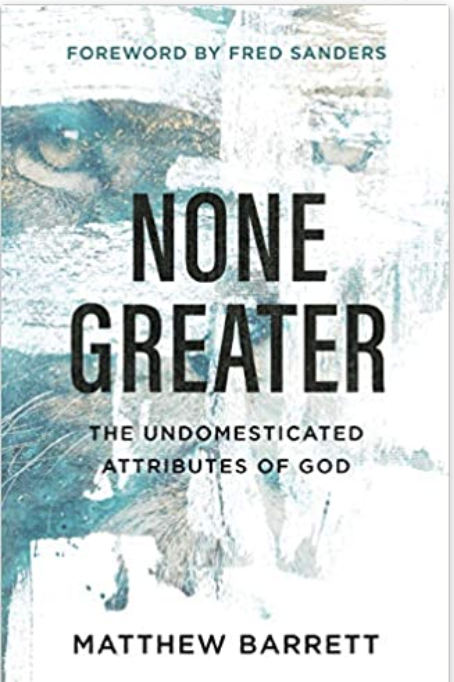None Greater: The Undomesticated Attributes of God
Matthew Barrett, in his book None Greater, does an amazing job of detailing the importance and necessity of Christians to rightly understand the God of the Scriptures, who is both the Sovereign and Savior of the universe.
It is a great book for learning and is very devotional.

His book relies on the early church fathers to anchor his defense of the study of God Himself. Church history has called this ‘classical deism,’ which defines the divine attributes of God. Attributes like simplicity, aseity, and timeless eternity.
Most Christians somehow avoid this critical topic of the attributes of God, which is so vital to the foundation of all Christian belief, the study of God Himself. Sadly, many contemporary churches for all practical purposes practice idolatry. These are strong words, but after reading this book, you might just agree.
I believe Matthew Barrett has delivered the Christian a mighty tool by writing this book, most importantly by using Scripture and the church’s long-standing interpretation of these scriptures regarding this most important doctrine.
For me, the bottom line take away from this book is that our God is not like us at all! Whatever we are believing as Christians and how we think about Him, Barrett concludes that we, no matter what, have fallen short in our understanding of who He is.
He quotes Anselm (born in 1033 and recognized in modern times as the originator of the ontological argument for the existence of God), “God is far greater in all his attributes.”
Barrett begins his introduction with the title, “Surprised by God.” He goes on to detail attributes that must correspond with Anselm’s conclusion that God must have in absolute perfection: incomprehensibility, aseity, simplicity, immutability, impassibility, eternity, omnipresence, and the list goes on.
God is these realities in perfectionism. Truly, we are all surprised by our triune God in every conceivable way.
Barrett is a big fan of our early church fathers and other standouts. He calls his favorites the “A team.” Augustine of Hippo (354-430), Anselm, (1033-1109), and Thomas Aquinas (1225-1274). Each of these early church giants contributed significantly in how we understand the doctrine of God today, whether we know it or not.
Augustine is one of the early church fathers who masterfully explains the Creator and creature distinctions. God is both near in all his actions and yet at the same time, transcendent and deeply hidden (truly incomprehensible). Barrett explains how God’s other perfect attributes work the same way as well.
God affects change, but He never changes. He creates, but He is uncreated. He nurtures, but He needs no nurturing, He brings maturity, but He is never in the state of potentiality.
Augustine concludes that God is all about His own perfections, even praying about God’s perfections that display His beauty and strength. Augustine’s understanding of God affected Barrett in a profound way and he has never been the same since.
Barrett also interacts with Anselm in much the same way. Anselm said of God, “He is something-that-which nothing-greater-can-be-thought, that which it is impossible to think anything greater.” This great statement about God needs to be contemplated and treasured in the heart and mind of every devoted Christian.
Anselm was masterful at applying this great statement to the reality of all His imposing attributes. It is when we think about God’s perfections individually that we see the vast infinitude of each and how ultimately, all of His attributes are connected and are interrelated and cannot be separated.
We are thankful for Anselm and his contribution to the discussion.
I hope that this short review of Barrett’s book might compel you to read it and grow in your understanding of our great God.
More in Monthly Newsletter
May 1, 2024
The Christian Ethic of Joy and SufferingMay 1, 2024
Elders ReportMay 1, 2024
Deacons Report